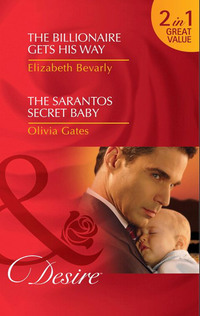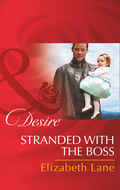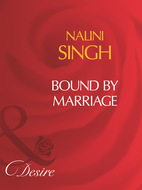Das Buch kann nicht als Datei heruntergeladen werden, kann aber in unserer App oder online auf der Website gelesen werden.
Buch lesen: "The Billionaire Gets His Way / The Sarantos Secret Baby"

The Billionaire
Gets His Way
Elizabeth Bevarly
The Sarantos
Secret
Olivia Gates

MILLS & BOON
Before you start reading, why not sign up?
Thank you for downloading this Mills & Boon book. If you want to hear about exclusive discounts, special offers and competitions, sign up to our email newsletter today!
Or simply visit
Mills & Boon emails are completely free to receive and you can unsubscribe at any time via the link in any email we send you.
The Billionaire Gets His Way
“Actually, it’s you who owes me,” Gavin said. “And I’m here to give you a chance to make good on the debt.”
Oh, Violet didn’t like the sound of that at all. “I beg your pardon? You want me to go to this fundraiser with you?” she asked incredulously.
“No, I don’t want that,” he told her. “But I don’t have much choice. No other woman in town will be seen with me, thanks to you. And going to this thing alone would only illustrate that fact to everyone there.”
“Well, sorry, but I already have plans for the evening,” she said. “Maybe next time you could call first. Surely if you can figure out where I live, you can locate my phone number. Both are unlisted, after all.”
“I don’t think you understand, Ms Tandy,” he said. “You seem to think you have a choice in the matter. Like me, you don’t. You owe me,” he said again. “And I’m not leaving until you pay up.”
About the Author
ELIZABETH BEVARLY is a New York Times bestselling, RITA® Award-nominated author of more than sixty books and novellas, and she recently celebrated the twentieth anniversary of seeing her first book in print! Before writing, she worked in a variety of jobs, from retail to restaurant work to editorial assistant (never let anyone tell you a degree in English makes you unemployable), but now she happily makes her living writing full-time. She’s lived in places as varied as San Juan, Puerto Rico and Haddonfield, New Jersey, but now makes her home in her native Kentucky with her husband and son and two cats of questionable sanity. (But then, aren’t they all?)
Dear Reader,
When I read an article in my local paper about how women are beginning to rent high-end fashion for special occasions instead of buying it, I was intrigued. Women haven’t traditionally been big renters of clothing. Women traditionally want to own their clothing—especially high-end fashion. (Okay, okay. If they’re like me, they want to own it for the lowest possible price, but that’s beside the point. It’s also part of the fun. But I digress.) I figured women renting expensive clothing and jewelry must have an interesting reason for doing so. I also figured such women must have some interesting stories to tell.
Violet Tandy is the first of three women who will visit my fictional Chicago boutique, Talk of the Town, to rent expensive clothing she can’t afford to buy. And her reason is certainly innocent enough. What isn’t innocent is Gavin Mason’s reaction to her in those rented duds. And boy, does that guy know how to make sparks fly …
Happy reading!
Elizabeth Bevarly
One
All Violet Tandy had ever wanted out of life was a place to call home. A home of her own, not a foster home like the myriad ones where she grew up. The kind of home people had in old movies, with white clapboard and black shutters and full-grown sugar maples canopying the front yard. And a picket fence. Had to have a picket fence. And a broad front porch with a wicker swing where she could reread all the books she’d loved as a child—Jane Eyre and Judy Blume, Lassie Come Home and Louisa May Alcott. Only she’d own the books and not have to return them to the library every week.
Roses and lilac bushes would grow lush and fragrant around the perimeter of her house, morning glory would zigzag up the chimney and wisteria would drip from the eaves of the back porch. She would crochet wispy sweaters and bake cheerful pastries to support herself. She would live and let live and be content with her solitary existence. And she would never, ever harm another living soul. Yep, a tranquil, unsullied life in a comfy, uncluttered cottage all to herself was the only thing Violet Tandy had ever wanted.
Which was why she wrote a memoir about being a high-priced, high-society call girl.
Not that Violet had ever actually been a call girl, high-priced, high-society or otherwise. And not that her memoir was actually a memoir—it was a novel written to read like one, a trend she had noticed was becoming more and more popular with readers these days, herself included. Gracie Ledbetter, her editor at Rockcastle Books, had been so swept away by the story, that when she called Violet to make an offer on the book, she had admitted that if she didn’t know better, she would have thought Violet actually was a call girl, and that her novel—and that was how Gracie had said it, as if she were italicizing it—was actually a novelization—again with the italics—of her real life experiences.
In fact, now that Violet thought about it, Gracie continued to do that—speak of the novel in italics, as if she’d never quite been convinced that the book was complete fiction. Even now, a year after Violet had signed the contract on the completed manuscript and a few weeks after the book’s debut, Gracie still asked things like, “Does the Princess Suite at the Chicago Ambassador Hotel really make you feel like a princess when you’re lying on the bed staring up at the castle mural on the ceiling?”
Well, how would Violet know? The only reason she’d even seen the Princess Suite at the Ambassador was because she’d worked there as a housekeeper and had changed the sheets on the bed. Whenever she reminded Gracie of that, however, her editor would reply, “Oh, riiight. Of cooourse. You worked there as a housekeeper. Not as a … you know,” in a way that wasn’t quite as convincing as Violet would have liked.
And once, Gracie had asked if the croque monsieur with truffle sauce at Chez Alain really could fill up a person for three days as the review of the five-star restaurant had claimed.
Well, how would Violet know? The only reason she’d even tasted the croque monsieur with truffle sauce at Chez Alain was because she’d worked there as a hostess, and all the employees had had a bite or two of new dishes every time the menu changed. Whenever she reminded Gracie of that, however, her editor would reply, “Oh, riiight. Of cooourse. You worked there as a hostess. Not as a … you know,” in a way that wasn’t quite as convincing as Violet would have liked.
No matter. She was certain that the reason Gracie asked such questions was simply because she got so carried away by the—quite fictional—prose. With any luck, the reading public would react similarly, and the book would soar to the top of the New York Times bestseller list, something that would earn Violet enough money to buy the snug little Norman Rockwell house in the Chicago suburbs that she’d always dreamed about.
Her initial advance for the book had actually been rather modest, but thanks to the reaction Gracie’s executive editor had had to the revisions on the manuscript, they’d bumped up its initial print run, changed the title to High Heels and Champagne and Sex, Oh, My! and convinced Violet to take a pen name that sounded a lot racier than her own: Raven French. Although Violet had been hesitant about that last, she’d conceded, and the combination had worked brilliantly. Its first week of sale, High Heels had debuted at number twenty-nine on the list and gone back for a second printing. Then it jumped another four places the following week. Now it was poised to enter the top fifteen and, having gone back to print for a third time, would doubtless climb higher still in the weeks to come.
Which was how Violet-Tandy-slash-Raven-French came to be sitting behind a table stacked with copies of her book at a packed bookstore on Michigan Avenue one sunny afternoon in October. And how she came to be staring into the most extraordinary pair of blue eyes she had ever seen that belonged to one of the most gorgeous men she had ever beheld. He was sitting in the back row and hadn’t taken those blue eyes off her once since seating himself. And his scrutiny, although not exactly unwelcome since he was, in case she hadn’t mentioned it, gorgeous, was beginning to make Violet feel a tad squirmy.
He was just so … intense. So … overwhelming. So … gorgeous. And God, so big. Even though he was sitting, he was head and shoulders taller than all of the women—taller than even the handful of men—who were present, and his shoulders completely eclipsed the chair back. His hair seemed even blacker than her own, but where she’d let hers grow past her shoulders, his was cut short by an expert’s hand. And those eyes. Pale, nearly translucent blue, startling in their clarity and framed by sweeping, dark lashes. Although it was Saturday, he was dressed in a dark suit, something else that made him stand out from the otherwise laid-back crowd.
Even Violet-slash-Raven wore a casual outfit, picked out by the publicist Rockcastle Books had assigned to her. Marie had advised the fashion-challenged Violet on every aspect of her authorial self. Today, she wore a pair of black trousers and three-quarter-sleeve black top with a deep V neckline, coupled with more-strap-than-shoe stilettos. All were, of course, from the finest couturiers, since Violet Tandy … ah, she meant Raven French … needed to look like the wildly successful author she was supposed to be.
Of course, Violet couldn’t afford the expensive labels Raven needed on the rather modest advance for her book. Fortunately, Marie had pointed her toward a boutique off Michigan Avenue that specialized in the short-term rental of haute couture and expensive jewelry for Chicago women who wanted to pretend they were members of the high society that was normally denied them.
For her outfit today, Violet … or, rather, Raven … had opted for clothes by Prada and shoes by Stuart Weitzman. To complement both, Marie had chosen a dazzling Ritani jewelry set—a pendant, earrings and bracelet fashioned of exquisite diamonds and amethysts that matched the eyes that had given Violet her nickname.
Her real name, regrettably, was Candy. Candy Tandy. It was only one of the indignities her mother had bestowed upon her before the final one of abandoning her at the age of three in a discount store with a note pinned to her Smurfette sweatshirt describing her as a problem child that no one would ever be able to love.
But that, along with everything else that had happened in the past twenty-nine years, was the past. These days, Violet thought only about the future. A future in her wisteria-laden house where she would take in strays of all kinds—canine, feline, equine, bovine, she didn’t care. She might even become a foster parent herself someday. But only if she could guarantee that the children in her care would stay in her care and never be shuttled from one place to another, as she’d been. They’d be able to make friends who wouldn’t be taken from them, the way hers had inevitably been, and they’d make emotional connections to other people that went beyond superficial, the way she’d never been able to do.
For some reason, that drew her attention back to the blue-eyed man in the back row. He was still staring at her. Intensely. Overwhelmingly. Gorgeously. He was in no way the kind of person Violet had expected would read her novel. In fact, he seemed more like the kind of person who might have shown up in the book as a character—perhaps one of her fictional heroine’s many fictional clients. Each was an amalgam of men Violet had modeled after the clients and patrons of her former places of employment. Rich men. Successful men. Powerful men. Men who cared more about their images, their reputations and their status in both business and society than anything else—anyone else.
Somehow she managed to tug her gaze free of the man in the back row and drive it across the other people who had come to hear her speak about her book before having their copies signed. Mostly female, these were her real readers. Women who were fascinated by the idea of sex for sale and by female protagonists who were in charge of their own sexuality. Who used their sexuality, the most powerful weapon they possessed, to get whatever they wanted. Who enjoyed no-strings-attached encounters with powerful men who paid exorbitant amounts of money to have women do things to them—and to do things to the women in return—that many would never even consider doing or having done to them during regular lovemaking with their usual partners.
Frankly, Violet wasn’t sure she got that. Not that she was so worldly in her own encounters. Certainly she’d had boyfriends from the time she was old enough to want one, and she’d lost her virginity when she was a teenager. But she’d never quite understood the fascination with sex that most people had. The men with whom she’d been involved hadn’t been all that special—or made her feel all that special. Which, she supposed, was why there hadn’t been all that many. The way she saw it, sex was a normal physical need, like eating or sleeping or bathing. Except needed a lot less often.
A college-aged woman who worked for the bookstore announced it was time to begin, bringing Violet’s attention to the matter at hand. Namely, the gorgeous, overwhelming man in the back row.
No! she immediately corrected herself. To the talk she was supposed to give to the gorgeous, overwhelming man in the back row.
No! she corrected herself again. To everyone who had come to buy her book today—she did a quick count, multiplying the number of seats across by the number of rows deep, adding another fifteen for the people standing and figured the total to be … carry the six, add the eight … around fifty-two—people who had come to buy her book today. Wow.
Ka-ching. She could smell the wisteria already.
She spoke for twenty minutes, having chosen as her topic the aforementioned philosophy of women in charge of their own sexuality and the appeal of having sex without the hindrance of emotion to muck things up. She followed up with the conundrum of how something so physical could even be tied to something so emotional—like love, of all things—in the first place.
She avoided talking about her own life experiences since, one, she was something of a private person in that regard and, two, she really didn’t think anyone would be interested in her poor-poor-pitiful-me background. Instead, she focused on the motivation, goals and journey of Roxanne, her book’s protagonist. She talked about how each of the men who became Roxanne’s clients symbolized some aspect of the human condition, and how her heroine’s submission to each represented another milestone in her personal growth.
Oh, God, she was good.
In fact, Violet … she meant Raven … had organized the book so that each chapter after the first—in which Roxanne was hired by a Chicago madam named Isabella, who herself personified society’s obsession with using sex to promote consumerism—was subtitled by the name of one of the character’s many clients. There was introverted Michael, who represented Roxanne’s need to let go of her inhibitions. And uncompromising William who showed her how following the rules wasn’t always a bad thing. Studious Nathaniel kindled her quest for knowledge, while carefree Jack helped her recognize her capacity to feel joy. And all of them—it went without saying—were lovers of Olympian caliber who gave Roxanne mind-blowing orgasms along the way.
The book culminated in the final chapter, Ethan. Ethan was the idealized notion of the perfect man, the one who fulfilled Roxanne in ways none of the others had managed alone, and who carried her to both sexual and emotional heights that. Well, that didn’t exist, quite frankly. Talk about a work of fiction. Ethan was ultra-masculine in every way, but could still respect a woman for all her strengths, desires and independence.
Yeah, like that was ever gonna happen in real life.
After finishing with her talk, Violet-Raven opened the floor to questions, and a dozen hands shot up. Not from the man in the back, though, she noted, in spite of the fact that he continued to study her with even more intensity than before. In fact, his intensity seemed to have turned into something akin to anger, because those amazing blue eyes narrowed now when he looked at her, and that full, luscious mouth turned down at the corners. She had no idea why he would react in such a way to a talk she’d thought was pretty danged insightful, so she turned her attention to the woman sitting next to him, an owner of one of the hands in the air.
“You there,” she said with a smile as she pointed to the white-haired, apple-cheeked woman in her seventies or eighties.
The woman smiled as she stood, the sort of smile that made Violet feel warm and wistful inside, because she looked like the grandmother Violet had always fantasized about having when she was a child. Someone who would bake cookies and darn socks and say, “Oh, my stars,” and wear sweaters with horse appliqués.
“Is it true,” the woman said in a sweet, gentle voice, “that you’re the one who invented the sexual position called the ‘centerfold spread?’”
Oh, my stars, Violet thought, struggling to keep a straight face. Clearly the woman’s years were so advanced that she’d confused Violet-Raven as the heroine of the book, not its author.
“Um, no,” she said. “That wasn’t me. It was my book’s protagonist, Roxanne.”
Nana’s eyebrows knit in a sign of clear confusion. “But I thought you were Roxanne.”
“No, ma’am,” Violet told her. “I’m, uh, Raven.”
“But didn’t you write the book?”
“Yes, but—”
“And the book is a memoir about a call girl.”
“Yes, but—”
“Then you’re the one who invented the position.”
“No, I—”
“What I’d like to know,” a woman with dark hair who was hipping a baby interrupted, “is exactly how the crème de menthe thing works. Now, did you drink that before performing oral sex on your customers, or was it meant for external use only?”
Violet was vaguely horrified by the personal pronoun used in the question. She’d read about the crème de menthe thing in a magazine. She’d never actually tried it. Why did the young woman assume otherwise?
“Actually, I never—”
But before she could even complete her reply, another woman, this one a college-aged blonde with little black glasses, stood and said, “My boyfriend and I are going to be spending the summer in Italy. Could you talk more about that sex club Francesco took you to in Milan?”
Violet opened her mouth to reply to that, but not a single word emerged. She was beginning to sense a pattern here. Everyone who had asked a question thought she was her fictional character Roxanne. They didn’t seem to realize the book was fiction. Even though the story read like a memoir, the blurb on the cover flap made clear the work was a novel. The reviews had all been in the fiction section of whatever periodical was doing the reviewing. Not to mention the fact that Roxanne’s adventures were so over-the-top, no one could possibly believe they had actually happened to anyone.
Could they?
The sex club/Francesco query evidently reminded a lot of people of questions they wanted to ask, because in the scant moment of Violet’s silence, the crowd erupted into what felt like hundreds of questions. Did Violet really have sex with Sebastian on the roller coaster at Knott’s Berry Farm? What was her real reason for not doing that porno Kevin wanted her to do? Where did she purchase those crotchless panties with the whistle sewn on them that Terrence had liked so much?
On and on it went until the crowd bordered on chaotic. That was when the young woman from the bookstore stepped in and, in a very effective crowd control voice, indicated that the question-and-answer segment had now concluded, and Ms. French would be happy to sign her book, and would everyone please line up in an orderly fashion who wished to have their copy of High Heels and Champagne and Sex, Oh, My! autographed.
Not everyone who had attended the signing got in line, but many did. And although most of those wanted to chat with Violet for a few moments about the book, the bookstore clerk thankfully kept the line moving so that Violet was spared having to hear too many more questions about Roxanne’s exploits being her own. By the time she signed the last available copy—and my, but the fragrance of the roses was mingling with the wisteria at the sight of the empty table—she was battling writer’s cramp and on the verge of exhaustion.
Unfortunately, as she was capping her Sharpie and envisioning her return to her apartment to don her grubbiest jeans and T-shirt and pop in a DVD of Casablanca, someone slammed another copy of the book down on the table in front of her. Hard. Startled, Violet glanced up and found herself gazing into incredible, nearly translucent blue eyes. Blue eyes that had now traveled miles beyond intense, and kilometers beyond anger, to debark at fury central.
“Um, hello,” she managed to say. “I, ah … I’m sorry. I didn’t see you standing there.”
The fact that she had overlooked him—as impossible as that seemed even to her—made him narrow his eyes even more angrily. But he said nothing, only shoved the book across the table toward her. Hard.
Somehow she tore her gaze away from his and forced it to the book, which, she told herself, should have way more importance to her anyway. But her attention fell instead on the hand that had splayed open atop it, obscuring the cover art of black patent stilettos, champagne effervescing in a slender flute and red lace panties and bra tossed carelessly between them. It was a large, masculine hand whose thumb, by its placement, seemed to caress the red lace of the lingerie. A very large and masculine hand, in spite of the elegantly wrought ring that wrapped its third finger, gold inlaid with onyx, that might or might not be a wedding band, since the hand happened to be his left one. But the hand didn’t move from the book, making it impossible for Violet to sign it, so she looked at him again. He stared at her with unmistakable hostility, and her confusion mounted.
She tried to remember if she’d met him somewhere before and unwittingly done something to generate such a reaction. Had she accidentally botched his reservations at Chez Alain or overlooked a smudge in his bathtub at the Ambassador Hotel? Had she messed up the hem of his trousers when she’d been a seamstress at Essex Tailors or sent home the wrong cuff links from the tony men’s shop where she’d been a salesclerk? Absolutely not, she immediately decided. Not only had she never made such mistakes at her previous jobs, but she would definitely remember eyes like those and a man like him.
Since he evidently didn’t want his book signed, she asked, as politely as she could, “Did, um, did you have a question?”
For a moment, he said nothing, but his expression changed, easing up infinitesimally. He looked at Violet almost as if he were the one trying to remember if he’d ever met her before, and what he might have unwittingly done to her. Which she found laughable in the extreme, since a man like him never did anything unwittingly.
Finally, he dropped his gaze to the book and removed his hand from its cover so that he could flip it open. He turned to a page toward the back that he had marked with a strip of what looked like paisley silk ripped brutally from some unsuspecting garment. Then he shoved the book toward Violet and thrust his finger at the heading.
“Chapter twenty-eight,” he said.
That was it. No question, no observation, just the number of the final chapter of the book, the one headed “Ethan.” Which of all the male characters Violet had written about in High Heels, was the one her readers had responded to most. He was the one who was cited in all the reviews the book had received so far, the one who was whispered breathlessly about by talk show hosts who had hyped the book on TV. He was the culmination of all things strong, masculine, confident and rich. When he moved in his worlds of business and society, he was ruthless, arrogant and overbearing. Although his couplings with Roxanne had been earthy, powerful and raw, there had been a tenderness inside him that almost—almost—made her heroine fall head over heels in love.
Which was yet another example of how fictional the book was, and how Violet couldn’t possibly have written it from personal experience. No way would she ever fall in love. She lacked the capacity for such an emotion. She’d learned before she was a teenager not to get too emotionally invested in anyone, because, inevitably, she would be separated from them somehow. Either she’d be moved to a new foster home, or her new friend would be. Sometimes it was the foster parents themselves she lost, either to illness or economics or caprice.
No way was she ever going to risk actually falling in love with someone.
“Yes?” Violet asked the man. “Did you have a question about chapter twenty-eight? About Ethan?”
“Not a question,” he said. “A demand.”
“What kind of—”
“I demand a retraction,” he stated without letting her finish.
Okay, now Violet was really confused. “A retraction?” she echoed. “What for? Why would I need to print a retraction? The book is—”
“Malicious, defamatory and untrue,” he finished for her. “Especially chapter twenty-eight.”
Well, of course the book was untrue, she thought indignantly. It was a novel. Duh. Why did people keep thinking it was an actual memoir? Violet must be a better writer than she’d realized. Still, the rest of his accusation was ridiculous. Novels couldn’t be malicious or defamatory, thanks to that untrue business. So his demand for a retraction was likewise ridiculous.
Nevertheless, she hesitated before replying, not wanting to upset this guy any more by insulting his alleged intelligence. Carefully, she began, “I’m sorry if you didn’t enjoy the book, Mr….?”
Instead of giving her his name, he glared at her some more and said, “My enjoyment of it—or lack thereof—is immaterial. However, I do know for a fact that chapter twenty-eight is libelous and demands a retraction. Just because you changed the man’s name to Ethan—”
“Changed his name?” Violet echoed. “I didn’t change anyone’s name. I didn’t have to. Ethan is a fabrication. The book is a—”
“You can’t disguise a man’s identity simply by changing his name, Ms. French,” the man continued relentlessly, as if she hadn’t spoken. “You described Ethan’s coloring, his profession, his office, his home, his hobbies, his interests, his physique, his … technique … Everything. In precise, correct, detail.” At this, he snatched up the scrap of silk with which he’d marked the page. “You even identified the manufacturer of his underwear.”
Violet shook her head in mystification. She couldn’t decide whether her interrogator was simply a little misguided or a raging loony. She turned to the bookstore clerk, hoping she’d take matters into hand now as she had with the overly enthusiastic crowd earlier. But the young woman was staring at the dark-haired man in openmouthed silence, evidently even more overwhelmed by him than Violet.
So Violet turned back to her, ah, reader, still not sure what to say. Maybe if she played along with him for a minute, disregarding, for now, whether the book was a work of fiction or nonfiction, she could talk him down from whatever ledge he was standing on.
Cautiously, she ventured, “Um, a lot of men wear paisley silk boxers, Mr….”
Still, he didn’t give her the name she’d not-so-subtly requested. Instead, he shook the scrap of silk at her and replied, “Not imported from an exclusive, little-known shop in Alsace for whom this design is completely unique.”
Oh, really? Violet thought. Well, she’d read about the place in Esquire magazine—guess it wasn’t as little known as he realized—and how they employed their own weavers and designers, and probably even their own worms, so that their garments were each utterly luxurious and completely one-of-a-kind. And also outrageously expensive, which was why she’d written that Ethan wore them.
Violet sighed with resignation. “I don’t know what you’re trying to say. Ethan is a character in my novel. The story is fiction. Roxanne isn’t real. Ethan isn’t real. If I described him in a way that resembles someone who actually exists, I assure you it was nothing more than serendipity. There are a lot of men out there who work and play and live the way the characters in my book do.”
“You and your publisher may be marketing the book as a novel, but there’s no question in anyone’s mind that the work is based—and in no way loosely—on your actual experiences as a call girl.”
“What?” Violet exclaimed. “That’s not true! I’ve never—”
“There’s also no question in anyone’s mind about Ethan. You’ve described the man so explicitly and perfectly that everyone in Chicago knows who he is.”
Violet spared a moment to be proud of herself for writing such great prose that she’d brought a character to life—almost literally—for so many of her readers. Then she remembered that this guy had just accused her of being a prostitute, and she got mad all over again. Unfortunately, before she could express that outrage, her assailant spewed more of his own.
“And if you don’t print a retraction to this … this …” He thumped the book contemptuously. “This piece of trash—”









